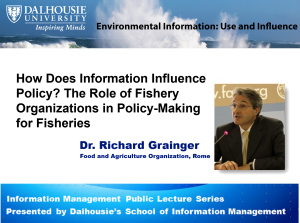 Fisheries governance and information pathways in fisheries management are exceptionally complex. At the same time, large quantities of fisheries information on numerous subjects are available from a wide range of providers for a diversity of users. These points were emphasized in a public lecture at Dalhousie University on 20 September 2013 by Dr. Richard Grainger, recently Chief, Statistics and Information in the Fisheries and Aquaculture Department of the United Nations Food and Agriculture Organization (FAO), Rome. Dr. Grainger was in Halifax to participate in a two-day workshop hosted by the EIUI research initiative which highlighted research being conducted in partnership with governmental and non-governmental organizations.
Fisheries governance and information pathways in fisheries management are exceptionally complex. At the same time, large quantities of fisheries information on numerous subjects are available from a wide range of providers for a diversity of users. These points were emphasized in a public lecture at Dalhousie University on 20 September 2013 by Dr. Richard Grainger, recently Chief, Statistics and Information in the Fisheries and Aquaculture Department of the United Nations Food and Agriculture Organization (FAO), Rome. Dr. Grainger was in Halifax to participate in a two-day workshop hosted by the EIUI research initiative which highlighted research being conducted in partnership with governmental and non-governmental organizations.
In his lecture, “How does information influence policy? The role of fishery organizations in policy-making for fisheries,” Dr. Grainger drew on his extensive experience in providing advice to fisheries managers and policy makers at national, regional, and international levels. He identified challenges in communicating advice and outlined new initiatives aimed at improving access to fisheries data and information through interdisciplinary collaboration. He noted that communicating complex scientific concepts to policy-makers without distorting the accuracy and validity of the message can also be problematic. The findings of a 1998 study, for example, showed that the state of global fisheries is often misunderstood and public opinions on this subject may have very little basis in scientific fact (Alverson & Dunlop, 1998). In some instances, misinformation may be promoted by lobbyists who can deliberately distort scientific facts or misunderstand findings. In addition to these communication issues, Dr. Grainger drew attention to the increasingly important role that the media and non-governmental organizations are fulfilling in the communication of information and its influence on policy-making.
A paucity of fisheries data from small-scale fisheries and the need for new types of data to implement the ecosystem approach to fisheries management are current challenges in fisheries management. The Food and Agriculture Organization has a major role with regard to data and information since it is a repository for global fisheries statistics and provides global direction through its international instruments on aspects of fisheries management. FAO is involved in collaborative initiatives, such as iMarine, which involves establishing a data infrastructure to support the ecosystem approach to fisheries.The iMarine infrastructure is designed to ensure that dispersed and heterogeneous data are available to stakeholder communities through a shared virtual environment. Another global initiative is the FAO’s “Strategy-STF [Status and Trends of Capture Fisheries],” a voluntary instrument aimed at providing a framework for the improvement of knowledge and understanding of fishery status and trends as a basis for fisheries policy-making (FAO, 2003).
Dr. Grainger concluded his lecture by reiterating the importance of reliable and accessible fisheries information and its communication to the public and policy-makers through clear, straightforward messages.
The video of this lecture can be viewed at this link.
References
Alverson, D. L., & Dunlop, K. (1998). Status of world marine fish stocks. Seattle: University of Washington.
FAO. (2003). Strategy for improving information on status and trends of capture fisheries. Rome: FAO.